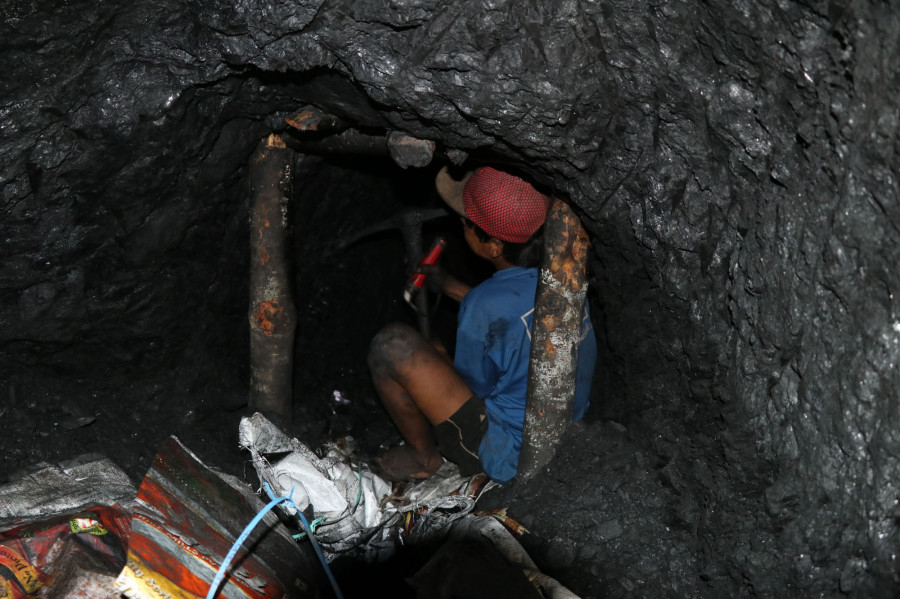National
Global coal supply shortage may hit Nepal too, manufacturers say
They have warned prices of building materials could skyrocket during the peak construction season.
Krishana Prasain
India is on the brink of an unprecedented power crisis as its coal stocks, which power more than half of the country's 135 coal-fired power plants, are running critically low. The coal shortage in India, where 70 percent of the electricity is generated using coal, has become a major cause for concern as it threatens to derail post-pandemic economic recovery.
The repercussions of global coal supply shortage are likely to be felt in Nepal as well.
It could deal a blow to Nepali manufacturers—mostly cement, iron, steel and bricks factories—who depend largely on coal for the production. Manufacturers say the prices of construction materials could skyrocket during the peak construction season, which may impact the country’s development projects.
The mid-September to mid-December is the prime season when most of the construction activities take place because of the climatic factor—monsoon ends and autumn sets in.
“If the severe shortage prevails for weeks, many factories may shut down,” said Dhurba Raj Thapa, president of Cement Manufacturers' Association of Nepal.
According to him, the price of coal has already crossed $200 per tonne within a few months from $70 per tonne. It’s nearly a three-fold rise.
“The cost of production will rise accordingly,” said Thapa.
“If the shortage continues, we have to close down the cement factories,” he said. “Nepal’s cement factories, currently, have a coal stock that can last up to a month and a half.”
According to the association, there are 64 cement factories operating in the country. Out of them, 21 factories are producing clinkers also. The coal crisis could jeopardise Nepal’s cement industry, puting the jobs of around 10,000 people at risk.
Thapa said that clinker producing factories will be automatically closed with the coal shortage and with no clinker, production of cement is not possible. The shortage in India means, it will not export clinkers to Nepal too, manufacturers say.
The price of cement is expected to increase by a minimum Rs100 per bag, Thapa said.
A bag of cement, weighing 50 kg, is priced between Rs550-650.
According to Thapa, the country mostly meets all its coal demand with imports from Australia and South Africa, followed by India.
According to Indian media reports, the major reasons for supply crunch in India is the lower than normal stock accumulation by thermal power plants in the April-June period and continuous rainfall in coal bearing areas in August and September leading to lower production and fewer dispatches of coal from the mines.
State-run Coal India that produces over 80 percent of India's coal had stated that an increase in global coal prices and freight costs had led to a curtailment in power production by plants using imported coal, adding to the pressure on utilities using domestically mined coal to ramp up output.
Also, sharp increase in power demand with the economy recovering from the coronavirus pandemic affected the supply leading to coal shortages globally.
Coal accounts for over 70 percent of India’s electricity output and utilities account for about 75 percent of India’s coal consumption.
India is the second largest producer of coal in the world after China and also one of the largest consumers.
Asia's coal price benchmarks have hit record highs in recent times, buoyed by global demand for power generation fuels as economies opened up. A major power crisis in China is the latest event driving global demand for the fuel.
Brick manufacturers are overly worried.
With the end of four-month long monsoon season and Covid-19 cases decreasing, brick producers were expecting a recovery after the festivals.
But global shortage of coal has come as a huge setback for the country’s brick industry that fully depends on imported coal.
Mahendra Bahadur Chitrakar, president of the Federation of Nepal Brick Industries, said coal stocks are running critically low in most of the brick kilns in the midst of a peak production season.
“I do not know how to operate the factory after Tihar. I have no coal in stock,” Chitrakar, who owns Uma Maheshwar Brick Factory in Chandragiri, Kathmandu, told the Post. “If coal supply does not improve, we have to close down.”
Brick factories are fully dependent on the coal imported from India. Chitrakar said that producing bricks using electricity will cost a lot.
There are around 1,250 brick factories in the country directly employing around 350,000 people, who are now on the brink of losing their jobs.
The impact of coal shortage is seen less on steel factories as they use electric arc furnaces.
Kiran Prakash Saakha, senior vice president of Nepal Steel Rolling Mills Association, said that the global coal shortage will not have a ‘dire impact’ on steel factories as most of them have been using electric arc furnaces.
The import of coal is huge in Nepal.
According to Nepal Rastra Bank, the country imported coal worth Rs27.19 billion in the fiscal year 2020-21.




 20.12°C Kathmandu
20.12°C Kathmandu















